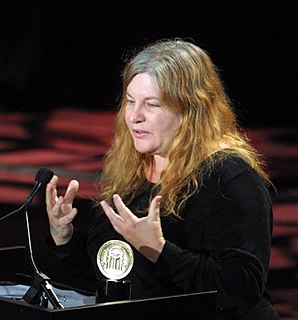A Quote by Rebecca West
Hatred of domestic work is a natural and admirable result of civilization. ... The first thing a woman does when she gets a little money into her hands is to hire some other poor wretch to do her housework.
Related Quotes
Where woman has taken her place in business she has found her method ready-shaped for her, and following that, she does her work,if with a certain amount of monotony, yet without undue fatigue. Her hours are fixed, and as a rule she gets needful change of scene as she goes to her business and returns to her home or the place where she lives. But the "home- maker" has not, nor can she have, any such change, and her hours are always from the rising of the sun beyond the going down of the same.
The extraordinary woman depends on the ordinary woman. It is only when we know what were the conditions of the average woman's life - the number of children, whether she had money of her own, if she had a room to herself, whether she had help bringing up her family, if she had servants, whether part of the housework was her task - it is only when we can measure the way of life and experience made possible to the ordinary woman that we can account for the success or failure of the extraordinary woman as a writer.
From the first time he'd met her, he'd sensed an air of contradiction about her. She was very much a woman, but still retained a waiflike quality. She could be brash, and at times deliberately suggestive, yet she was painfully shy. She was incredibly easy to get along with, yet she had few friends. She was a talented artist in her own right, but so self-conscious about her work that she rarely completed a piece and preferred to work with other people's art and ideas.
In domestic life, the woman's value is inherent, unquantifiable; at home she exchanges proven values for mythological ones. She 'wants' to be at home, and because she is a woman, she's allowed to want it. This desire is her mystique, it is both what enables her to domesticate herself and what disempowers her.
In domestic life the woman's value is inherent, unquantifiable; at home she exchanges proven values for mythological ones. She "wants" to be at home, and because she is a woman she's allowed to want it. This desire is her mystique, it is both what enables her to domesticate herself and what disempowers her.
A woman cannot do the thing she ought, which means whatever perfect thing she can, in life, in art, in science, but she fears to let the perfect action take her part and rest there: she must prove what she can do before she does it, -- prate of woman's rights, of woman's mission, woman's function, till the men (who are prating, too, on their side) cry, A woman's function plainly is... to talk. Poor souls, they are very reasonably vexed!
Under Sharia law, If a woman has money, she can invest her money. The thing is, what we are concerned about is, in the public arena, there's a difference between a man and a woman. We would have complete segregation in the public arena, but other than that, if she wants to go to the market, if she wants to go to visit her relatives or for medicine or for education. There's a whole host of reasons why she would be out and about but, what we are saying is she not obliged to work. That is the job of the man.
In many poor countries, if the daughter is told who she's going to marry, and told that she's going to live in the village with her husband's family, she really has very little opportunity to make her own decisions. If she comes for a while to work in a factory, she has her own money. In family agriculture, it's never your money. It's whatever somebody decides to give you. For many people this is tremendously valuable, because then they can step up.
Every woman whether rich or poor, married or single, has a circle of influence within which, according to her character, she is exerting a certain amount of power for good or harm. Every woman, by her virtue or her vice, by her folly or her wisdom, by her levity or her dignity, is adding something to our national elevation or degradation. A community is not likely to be overthrown where woman fulfills her mission, for by the power of her noble heart over the hearts of others, she will raise that community from its ruins and restore it again to prosperity and joy.
Sometimes a woman's love of being loved gets the better of her conscience, and though she is agonized at the thought of treating a man cruelly, she encourages him to love her while she doesn't love him at all. Then, when she sees him suffering, her remorse sets in, and she does what she can to repair the wrong.
It is as great a crime to leave a woman alone in her agony and deny her relief from her suffering as it is to insist upon dulling the consciousness of a natural mother who desires above all things to be aware of the final reward of her efforts, whose ambition is to be present, in full possession of her senses, when the infant she already adores greets her with its first loud cry and the soft touch of its restless body upon her limbs.
We think of a feminist as someone a woman becomes in reaction to personal indignities and social injustices. But the truth is, such inequities only awaken her to the feminist she has always fundamentally been - that is, a person who understands that her first responsibility is to her own humanity. That's why, for my money, the first known use of the word 'feminist' is still the best, appearing in an 1895 book review: a woman who 'has in her the capacity of fighting her way back to independence.
"She (Minnie Ruth Solomon) was unusual because even though I knew her family was as poor as ours, nothing she said or did seemed touched by that. Or by prejudice. Or by anything the world said or did. It was as if she had something inside her that somehow made all that not count. I fell in love with her some the first time we ever talked, and a little bit more every time after that until I thought I couldn't love her more than I did. And when I felt that way, I asked her to marry me . . . and she said she would."
































